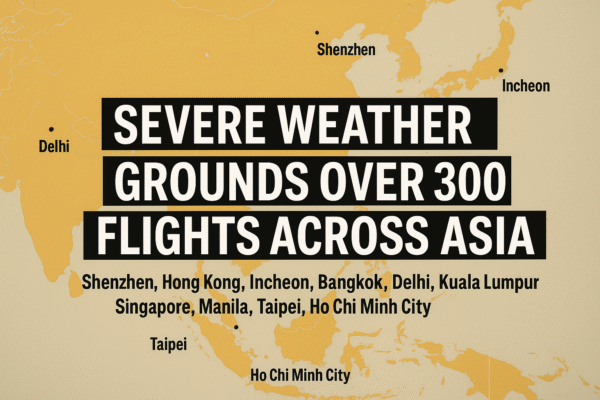In a bold move to strengthen its position as a top-tier global education destination, New Zealand has increased the part-time work limit for international students from 20 to 25 hours per week, effective immediately in 2025. This decision places the country ahead of major study-abroad competitors such as the United States and Australia, which have recently tightened restrictions on foreign student admissions and work rights.
The New Zealand Government, under the leadership of Education Minister Erica Stanford, views the reform as part of a broader initiative to “supercharge” the growth of the international education sector. According to official data from Education New Zealand (ENZ), the sector currently contributes approximately NZ$3.6 billion annually to the national economy. The government has set a bold target of doubling this figure to NZ$7.2 billion by 2034, aiming to boost foreign enrolment, enhance student engagement, and fuel long-term economic growth.
Supporting International Students in a Changing Global Landscape
The 25-hour work cap applies to eligible students enrolled in approved full-time study programs. It also extends to those participating in authorised exchange or study abroad programs, granting them broader access to New Zealand’s job market during their academic journey.
The increased work limit is expected to alleviate financial burdens, especially for students from developing economies such as India, Vietnam, Indonesia, and the Philippines. For many, these additional five hours can make a significant difference in meeting rising living costs while also gaining valuable work experience in a foreign labor market.
Aditi Mishra, a postgraduate student from India studying in Auckland, welcomed the change, stating, “This makes it a lot easier for students to manage expenses, especially with rent and groceries becoming more expensive in cities like Auckland and Wellington.” However, she also acknowledged that flexible, well-paying student jobs remain scarce, and managing longer work hours alongside a rigorous academic schedule could prove challenging.
Another Indian MBA student voiced concerns about mental health and burnout, noting that although the policy might relieve financial pressure, it could increase academic stress. “Working more hours while juggling full-time coursework is exhausting,” he shared anonymously.
A Strategic Shift in Global Education Dynamics
This reform arrives at a time when other top study destinations are becoming less accessible. The United States continues to impose strict visa controls and scrutiny, while Australia has capped its new international student intake at 270,000 for 2025, down from over 400,000 in previous years. These developments have made prospective students reconsider their options.
New Zealand, with its reputation for safety, quality education, and cultural inclusivity, is positioning itself as a favorable alternative. The government’s forward-looking policy framework now emphasizes a balance between economic opportunity and student welfare—an increasingly rare combination in the competitive global education arena.
Minister Erica Stanford emphasized the country’s intent to become a leader in international education, noting that “New Zealand is open, welcoming, and ready to support students looking to build global futures.”
Long-Term Growth Projections and Economic Impact
According to New Zealand Immigration and the Ministry of Education, the number of international students is projected to increase from 83,700 in 2024 to 105,000 by 2027, and potentially reach 119,000 by 2034. This growth will not only benefit universities and private institutions but will also fuel broader sectors like hospitality, retail, tourism, and healthcare, which benefit significantly from student spending and labor.
Beyond tuition, students also contribute through accommodation, food services, and domestic travel. Data from Tourism New Zealand shows that international students and their visiting families add millions to the domestic tourism sector each year.
Moreover, the New Zealand government envisions the creation of thousands of jobs—both directly and indirectly—as a result of this educational growth. Regional hubs such as Christchurch, Dunedin, and Hamilton are expected to benefit alongside major cities like Wellington and Auckland, helping to decentralize economic gains.
Enhancing the Student Experience and Cultural Integration
New Zealand continues to invest in community-based support systems, orientation programs, and mental health services to better support international students adjusting to a new country. Institutions are expanding Māori cultural programs and sustainability-focused learning experiences, aligning with the country’s values of kaitiakitanga (guardianship) and manaakitanga (hospitality).
In addition, the government’s commitment to safe housing, visa processing improvements, and integration opportunities makes it one of the most student-friendly countries in the world.
Competing Smartly with the U.S. and Australia
While tuition in New Zealand remains competitive, it’s the work-life balance, scenic beauty, and smaller, community-focused campuses that give it a clear edge. The government’s flexible approach to immigration and its responsiveness to international student needs further distinguishes it from countries like the U.S., where policy shifts often bring uncertainty.
From a strategic standpoint, New Zealand is not just reacting to global competition—it’s leading with innovation. By making international students feel more welcome and financially supported, the country is reinforcing its image as a smart, forward-thinking destination.
Final Thoughts: A Future-Focused, Inclusive Policy
As of 2025, New Zealand’s decision to expand work hours for international students is more than just a policy tweak—it is a signal to the world that the country values global talent. With clear targets, government support, and a commitment to inclusion, New Zealand is setting a benchmark in global education.
As more students around the world seek destinations that offer not only high-quality degrees but also practical life experiences, New Zealand stands ready to deliver on both—ensuring that foreign students feel valued, supported, and prepared for a prosperous future.
For more travel news like this, keep reading Global Travel Wire






















